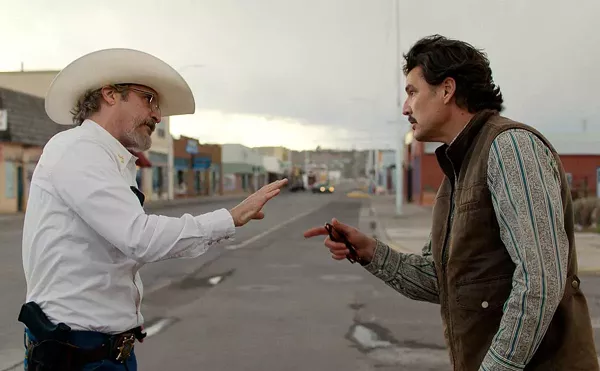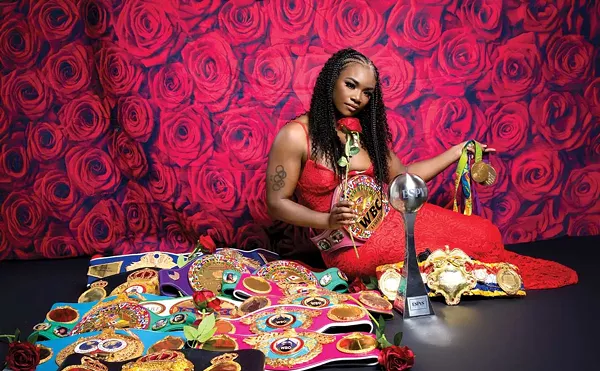
Audio By Carbonatix
[
{
"name": "GPT - Leaderboard - Inline - Content",
"component": "35519556",
"insertPoint": "5th",
"startingPoint": "3",
"requiredCountToDisplay": "3",
"maxInsertions": 100,
"adList": [
{
"adPreset": "LeaderboardInline"
}
]
}
]
Mulugetta Birru was recruited to direct the nonprofit Wayne County Economic Development Corp., where he hopes to foster widespread revitalization and redevelopment, as he did in Pittsburgh, before he can eventually retire in his home country of Ethiopia — if the political situation improves.
Pathe Jassi wouldn't pick any other place in America than Detroit to pursue his jazz career, which began in his home country of Senegal.
Metro Detroit's African-born people are relatively quiet, eclipsed by the country's most visible Arab-American community, a glitzy Greektown and the rapidly redeveloping community around Mexicantown. But on some Detroit streets, more Wolof, Amharic, Yoruba, Tigrinya and West African French are spoken than English, and Africans are becoming more visible, starting businesses like hair-braiding salons, markets, restaurants and import-export stores. Others are making their impact in less visible ways.
Hailing from Nigeria, Ethiopia, Kenya, Ghana, Cote d'Ivoire, Eritrea, South Africa and other countries, the area's African-born population is diverse within itself. Its growth in recent years, which is expected to continue, could change the face of the traditional black community here as it has in some other parts of the country.
"There are a lot of professionals. That is the big theme," says David Wiley, director of the African Studies Center at Michigan State University. "The statistics that I saw in the last census ... the Africans were the best-educated by far [of any immigrant group]. Of the population over age 25, at least 50 percent had one degree or more."
Numbering 10,007 in 1990 and 16,735 in 2000, the number of African-born people in Michigan nearly doubled to an estimated 30,898 by 2005, according to the U.S. Census. Of the state's African-born residents in 2000, 5,631 lived in Wayne County and 3,054 lived in Oakland County.
In 2000, 51,435 Michigan residents identified themselves as being of sub-Saharan African ancestry, up from 11,025 in 1990. Nationally, sub-Saharan Africans are a rapidly growing immigrant population. In 1990, according to census data, 223,005 people in the United States were born in sub-Saharan Africa. By 2000, there were 610,084, a 174 percent increase. During the same time period, the Latin American-born population grew by 97 percent and the South Asian population increased by 141 percent, according to the Center for Immigration Studies in Washington, D.C.
That so many African immigrants in the Detroit area are educated, professional and English-speaking makes it easier for them than some other new arrivals to adapt and succeed, Wiley says.
Many of the Africans in the Detroit area chose to come here for education or professional opportunities, although other parts of the country have attracted large numbers of refugees.
Still, for Detroit's African-born people, issues of race can persist, even within the black community where the Africans say they battle misperceptions about African life and sometimes hostility from African-Americans.
"I do remember a lot of black people saying that Africa was just a place that created disease," says Malkiah Shivachi, a 23-year-old first-generation Kenyan and accounting major at Eastern Michigan University. "I can also say that African-Americans do the least to find out the truth. It's terrible that they don't learn anything about us in school, but a lot of African-Americans do nothing to learn more."
Despite the ancestral link, both some Africans and African-Americans admit they can be incredibly divided. Some have had rude awakenings to hostility.
"I don't think it's easy to characterize what's happened in those relationships," Wiley says.
Michael Kamuyu is a Kenyan-born part-time faculty member in the department of Africana Studies at Wayne State University. Speaking at a celebration for Kenyan Independence several months ago in Detroit Kamuyu, said, "A lot of Africans born in America are not even comfortable with being called African. ... They get offended, as if they've just been insulted. Until blacks here in this country stop being scared to call themselves Africans, our cultures will continually be kept apart — not by oppression, but by the ignorance that stands in between us."
Ayeni, who bought a home seven years ago off Halsted and 13 Mile roads in Farmington Hills, says, despite being the first African in the neighborhood, she had no troubles. "My neighbors are wonderful," she says. "The surprising thing is, [the problems are] from mostly African-Americans, not Caucasians. It's something that puzzles me. ... People say African-Americans are not very accepting of Africans because of the history of slavery. They think the Africans sold them into slavery. I really don't get it."
Little Africas
Outside Rendezvous, a Senegalese restaurant in Detroit popular with local West Africans, a host of cross-cultural oddities can jump out at American patrons visiting for the first time. Some may find it a bit strange to hear Wolof, the common language of Senegal, being spoken on the corner of Curtis and Wyoming, but this is an everyday occurrence. In fact, one can sometimes stand at this exact corner and go at least 20 minutes without hearing a word of English. Inside, Rendezvous' television may be tuned to French-speaking stations broadcasting soccer. The food market next door is Senegalese-owned, as is the hair-braiding salon adjacent to Rendezvous and the clothing store across the street. Many Detroiters may not have paid attention but a handful of these "little Africas" are popping up.
African import guru Touray Kunda, 42, of Gambia, has been a staple in Detroit for the past nine years and has strong views on certain neighborhoods undergoing this African transformation. He points to an area near Eight Mile and Lahser roads, affectionately known as "Little Africa" by some who live in the vicinity. Some of these immigrants own houses, others rent apartments. Africans from all parts of the continent have gathered and formed a community.
"We used to joke that when you first arrive in America and get to the airport in Detroit, if you tell the cab driver to take you to Eight Mile and Lahser you will be safe," Kunda says. "Someone will help you get to where you are going and probably speak your language too once you get there."
Kunda's storefront, Touray Kunda Enterprises, some miles away at 14309 W. McNichols, specializes in African wares of all kinds and often doubles as a hangout for middle-age West Africans throughout the day. Because so many Africans are polylingual, it's not uncommon for Guineans, Gambians and Senegalese to gather and converse in various languages depending on who's there. According to Kunda, African immigrants generally socialize behind closed doors, often congregating in each others' homes for food and drink rather than going out to bars. Business deals are conducted in restaurants, not offices, and many African immigrants are self-employed; choosing to network among themselves to generate income instead of relying on outside investors.
This is not to say that African immigrants don't know how to step out and have a good time. For entertainment, such venues as Tropical Hut and Rhythm Universe International on Detroit's west side, are popular for lovers of high-life, Afro-beat and other styles of African party music. Tropical Hut designates Saturday nights for its African soirees and is generally packed with regulars and Caribbean nationals who want to let loose. During the day, the Nigerian-owned restaurant Squindles near Marygrove College is popular with students, and a lot of Africans who were interviewed say they spend considerable amounts of time socializing in food markets, a traditional custom back home.
Abdoulaye Aliou, of Senegal, who owns the Galoya Market in the Old Redford section of Detroit, says his food store is a major hub for Senegalese immigrants because the market sells strictly Halal meat and caters to Muslims. Often during the day, the staff and many of the patrons at Galoya Market lay down prayer mats in the middle of this tiny grocery store and pray, often with African-American patrons standing around for 10 minutes at a time waiting to be helped.
"Our Islam is not accepted by all Muslims so we pray amongst ourselves," says Senegalese computer technician Mamadou Diagne, who lives in Taylor. "There are certain stigmas against African Muslims but we are such a proud people, we don't care what some Arab Muslims think of us."
Another interesting enclave is the Lexington apartment building in Southfield, where a sizable chunk of the Senegalese community resides. It is an important location for Muslims of West African decent, as the building includes a large two-bedroom apartment that doubles as a makeshift mosque throughout the week. It is here that followers of the Murid sect of Islam, popular in Senegal, are able to worship in peace, hold services in Wolof instead of Arabic and set up an organized board of directors to manage all of the mosque's affairs. Money is collected from those who frequent the mosque, which handles everything from bills to immigration troubles to paying for funerals when someone dies.
"We are a very tight-knit community," Diagne explains. "If someone dies, everyone pitches in for their funeral and sends the body back home. It is unheard of for this not to happen. We don't even have homeless people in our community — it's something that you will never see. I don't sense that type of support amongst African-American families and I don't understand why."
Looks deceive
For many Detroiters, the most common images of African immigrants here are the dark-skinned men selling shea butter and oils during street festivals in Hart Plaza and women braiding hair in salons throughout the city. But many Africans who arrive in Detroit are here for school or are already professionals, and they find a prosperous niche within the economically challenged city.
Dr. Salewa Ola, 47, a Nigerian who founded the Detroit-based United African Community Organization (UACO), says Detroiters need to realize that most African immigrants who arrive in the United States are not just rank-and-file citizens back home. Having migrated to Michigan to study medicine on a scholarship, Ola knows first-hand how competitive it is for African-born students to win the opportunity of studying in the United States.
"Detroit people need to realize that when they see Africans here in the city, they are seeing the absolute best African men and women from our individual countries — we are not just average," he says. "For us to even be here, we have to be the brightest and the best just to come."
Among this group: Birru, who came to the United States in the 1970s. He was working for a bank in Addis Ababa that sent him for training with two government agencies in Washington, D.C. He then earned master's degrees in economics and finance at Syracuse University where he met his wife, an African-American from Pittsburgh. The couple returned to Ethiopia and had the first of their three daughters. Birru had a job with the country's chemical industry.
But the military dictatorship that came to power during that decade grew increasingly suspicious of people with ties to the United States; the new Ethiopian government was backed by the Soviet Union and Africa was one of the Cold War's battlefields. Birru, being Tigrayan and from northern Ethiopia along what is now the Eritrean border, was interrogated twice. The government feared the rebels who were from Birru's home area and suspected him of CIA-related activity.
"It was very rough," Birru says. "It was very bitter political circumstances."
Birru applied for and received a green card from the U.S. government, but announcing that could have been a death sentence in his home country, he says. Yet staying there was becoming more dangerous. Labor union leaders brought guns to meetings with Birru and a management team. Birru was watched by distrustful supervisors. His family was threatened.
As part of his work, Birru traveled extensively in Eastern Europe and was due for a meeting in Moscow. He arranged a flight to Rome on a Sunday, the same day a well-known Soviet airline flight landed there before continuing to Moscow. His bosses assumed he was taking that flight. They didn't check. Birru was on a different flight out of Ethiopia and stayed in Rome.
Four months later, his wife and daughter joined him, finally allowed to leave Ethiopia. The family went to stay with Birru's brother who was in graduate school at the University of Chicago.
"It was the biggest relief I had. I could get up in the morning and I could get back to my house without fear," Birru says.
Seven months later, Birru found an economic development job in Florida. A few years later he moved to Pittsburgh where he worked for 12 years as the executive director of the Urban Redevelopment Authority and earned a doctorate in international and public affairs from the University of Pittsburgh. He came to Detroit two years ago. His five siblings and mother also live in the United States.
"The beauty of this area, like New York, is the diversity," he says. "Is there a problem with race? Yes, there is. But we have to think positively and be part of the solution."
When he retires, Birru would like to return part time to Ethiopia to help with economic development there, and he sees future Wayne County projects involving development partnerships on his home continent.
"We're going to work on Africa," he says.
Ayeni has already started a foundation to assist with education in her home country of Nigeria. Some 15 years ago, as a recent psychiatry graduate from the College of Medicine at the University of Ibadan, she accompanied her then-husband to Detroit when he accepted a medical residency here. Ayeni took the medical licensing exams, passed and did a residency at Sinai Hospital.
She now is the medical director of Development Center Inc., where she also sees chronically mentally ill patients. In addition, she runs Foundida, an organization seeking to help Nigerians stay connected to their home country while supporting education and health care efforts there. The name, Foundida, is short for Foundation for Indigenous Development and Advocacy.
"In the past 20, 25 years the Nigerian economy has been steadily declining. A lot of people are out of jobs," she says. She returns to Nigeria as often as once a year and says it's important to contribute time, money and sweat equity to help Nigerians back home, who often lack basic necessities.
"Each time that I go back, I see something that breaks my heart. The roads are not paved. The infrastructure doesn't work," she says. "One sight I saw that was depressing to me was old people panhandling on the streets. They'd had jobs. They worked. They contributed to a pension plan. They're not getting it because somebody stole the pension," she says.
Education, Ayeni says, is the only hope for real improvement in Nigeria. "People will be able to understand more and think for themselves. That's the only thing that will help corruption," she says.
Her novel, Our Mothers' Sore Expectations, is set in Nigeria and portrays ordinary people challenging government corruption. She wrote it over a few years, stealing evening moments to work on it between her medical career and caring for her teenage daughter and son.
Proceeds from the book, which was published this year, go to Foundida.
"I'm trying to make some sense of the chaos that's going on, how we got to where we are," Ayeni says.
While seizing his own opportunities here in the United States, Jassi is currently studying for his GED and hopes to take courses at Wayne State University next year. Jassi says his time here in Detroit is a part of his destiny, but his dream is to return home and write an African symphony.
His vision is to see all of the African instruments playing together — bringing various musical styles such as Manjoko and Jola together in one orchestra. It's a tremendous challenge — no such symphony has ever been written and even now, Jassi anticipates working on this symphony for the rest of his life.
"It will take a lot of money and work, but with the right musicians, we can unite all of Africa through music — one day it will happen."
Making an impact?
According to some immigration experts, more sub-Saharan Africans have arrived in the United States voluntarily during the past 25 years than the total who were brought here during slavery. With roughly 50,000 Africans legally arriving every year, this figure surpasses the number who arrived during any single year of the slave trade.
According to the Center for Immigration Studies, about 70,000 people born in sub-Saharan Africa had entered the United States before 1980. In 2005, that number was estimated at 254,000. While some of these are African-born people of European heritage, most are black, says Steven Camarota, director of research at the Center for Immigration Studies in Washington, D.C.
"The steady decline in the percentage of African-Americans with ancestors who suffered directly through the Middle Passage and Jim Crow is also shaping the debate over affirmative action, diversity programs and other initiatives intended to redress the legacy of slavery," The New York Times wrote last year.
Of the top 100 countries ranked by number of people immigrating to the United States, seven were in Africa in 1990. By 2000 that had grown to 15, according to the Center for Immigration Studies.
Throughout the United States, this new African immigration is beginning to make an impact on select communities, both because of individual achievements and some community dynamics. Some examples:
• Barack Obama, the son of a Kenyan father and American mother, won election to the U.S. Senate in Illinois two years ago. He is talked about as a Democratic presidential candidate.
• In Minnesota, resettled Somalians are credited with tireless campaign work for Keith Ellison, a Democratic candidate for Congress in a district that last sent a Republican to Washington, D.C., in 1962. If he wins, Ellison, a native Detroiter who converted to Islam in college, would become the first Muslim in Congress and the first black Minnesotan in Congress. He has publicly thanked the Somali immigrants who helped secure his primary win in September.
• Adding the African-born to the larger numbers of immigrants from Caribbean, one black New Yorker in three is now foreign-born.
• Large numbers of Nigerians around Baltimore (about 14,500 in 2000 in Maryland), Texas (about 22,000) and New York (about 16,000) are influencing those communities as well as they launch businesses, purchase homes and have children who enter the school systems, for example.
"When you have small geographically based constituencies like that, yes, they can be a factor," says Jason Booza, a Wayne State University demographer.
Saba Gebrai, a native Ethiopian who works in the Detroit area as a consultant to nonprofit agencies, says it's inevitable that the southeast Michigan African community will become more visible — and more powerful.
"The power is absolutely going to come out at some point. It's just a matter of the right entity that can mobilize it or the right issue to mobilize the community," she says.
Detroit Mayor Kwame M. Kilpatrick questions whether there is enough communication between the traditional African-American community and Africans who have arrived in recent years and decades. Kilpatrick says he has high expectations for unity between the two communities and suggests the present relationship is nowhere near its potential.
"I don't know if Detroit is benefiting from African immigration because Detroiters themselves don't feel like they are benefiting from it," Kilpatrick says. "The community doesn't feel it, so we can't say that we're benefiting from it yet as a city. ... It's great for property taxes and revenue, but currently that's about it."
Booza, who works at Wayne State's department of family medicine, says that perception is due, in part, to the type of African immigrants who have come to Detroit. Because so many of them are successful, educated individuals, they don't gravitate toward an ethnic community like many recently arrived people and are therefore less identifiable as an actual group.
"Groups coming over that don't have to move up the socioeconomic ladder, they already come with the resources. They don't necessarily have that need to form their own community. You don't always have the visible impact," he says. "It's much easier for the high-income and the white-collar workers to integrate more easily into the more wealthy communities and sort of blend right in."
But some worry about the distinctions and divide between Africans and African-Americans.
"I think what's missing is that a lot of black people in this city have had no connection at all with the continent and so they look at Africans as being totally different," Kilpatrick said. "It's also said that Africans look down on African-Americans sometimes too. There's lots of ignorance involved. And there is also some educating that needs to be done on both sides."
Kenyan-born youth pastor John Kimani, 25, is also a strong believer in the dire need to educate Africans and African-Americans about each culture. While growing up in Kenya, Kimani had no direct contact with African-Americans but remembers being proud of the images of Tupac Shakur and Dr. Dre that he saw on MTV.
"In Kenya, I can remember tons of kids all running around trying to rap, trying to be just like black Americans," says Kimani, now a Youth Minister in Tuscola, 20 miles north of Flint. "All we really knew about them though was that they were entertainers."
When Kimani, then 12, moved with his family from Kenya to Los Angeles, he admits that he didn't know where to fit in — either hanging out with the curious white students who befriended him or the tougher-than-expected black students who seemed more ticked off by than curious about Kimani's differences. He says he was picked on routinely — and by the time Kimani's family moved to Michigan, when he was 15, things only got worse.
"I probably missed out on a lot of friendships," Kimani says. "That's not the way I expected things to be once I moved to America but the black kids used to call me names like 'monkey,' 'jungle boy,' 'boater,' all types of things — or they'd make fun of my accent a lot. It was very different to me. I thought the African-Americans would have at least embraced me more, but it wasn't like that."
Wayne State University senior Elizabeth Ajayi is doing her part to share African culture and educate Americans — including African-Americans — about her home continent and its people. When the Nigerian native started her studies in Detroit, she would attend events hosted by African student groups at University of Michigan and Michigan State University. Finally, she decided to launch the Wayne African Student Society at her own school where no such group existed.
With a membership of mostly African-Americans, WASS appeared in the homecoming parade last month and is planning an African week for the campus with poetry readings, lectures, music, a charity project and a dance.
"It's to bring the culture here," she says.
See Also:The white African-Americans
by Sandra Svoboda
These Caucasian immigrants once called Africa home.
Pathe’s path
by Jonathan Cunningham
How an African musician found his way to Detroit.
Schools that keep sight of the Motherland
by Jonathan Cunningham
Africa-centered education offers pupils a view of African heritage.





